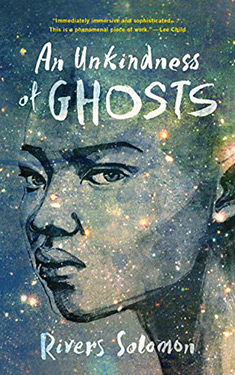Rivers Solomon
Completed 10/7/2024, Reviewed 10/7/2024
3 stars
This is the author’s first novel, published by a small publishing house. I think both facts are evident in that the book tries to do too much. I think it could have used a better editor. However, Solomon is an important queer, black author with a lot to say. Her second work, The Deep, was a brilliant collaboration with other writers and poets and walked away with the 2020 Lambda Literary Award. This book just needed some help making sure the flow was better and some extraneous things were excised.
Aster is a black woman on the autism spectrum. She lives on a colony ship called the Matilda. The upper decks are for the white privileged people and the lower decks are for the poor, black abused workers. Basically, they are slaves. The separation is maintained by an adherence to a weird religious dogma that has evolved over the hundreds of years the ship has been travelling to the “Promised Land.” Aster is the assistant to the gentle Theo, the Surgeon General who is also the nephew of the power-crazed second in command on the ship, Lieutenant. The supreme ruler of the ship is dying of something that Aster’s mother may have died from. Thus begins an investigation into her mother’s cryptic journals and the possibility of a ship-wide civil war against the abusive system that the Lieutenant has been upholding.
Yeah, there’s a lot in this book. I had a lot of trouble getting through the first half of it. It took me about that long to get that Aster was on the spectrum and experiencing things differently than the people around her. Her relationships are quite confusing. Theo has a deep fondness for her though she doesn’t see it. She just tries to determine if they are friends. Giselle, with whom she grew up, appears to have ADHD, which make their interactions very confusing in the beginning. After a while, though, I started to get it and picked up on Aster interactions with Theo, Giselle, and others. This is especially true of her interactions with guards, who clearly have no tolerance for someone who doesn’t communicate in a usual way. Clearly, a lot of thought went into creation of Aster. The characters were very well developed.
I thought the world building was really good too. But I had a hard time believing the ship was created as, or devolved into an antebellum South. It came across a little too much like a parable to make a point than a futurist vision. Perhaps I’ve read too many books that imply racial equality in the future. This was just a little tough to suspend disbelief.
I give this book three stars out of five, mainly because it’s a difficult read and I didn’t completely buy into the premise. I’d like to read Solomon’s newer works to see what they are like, if she has evolved as a writer and if the editing of her books are better.

No comments:
Post a Comment